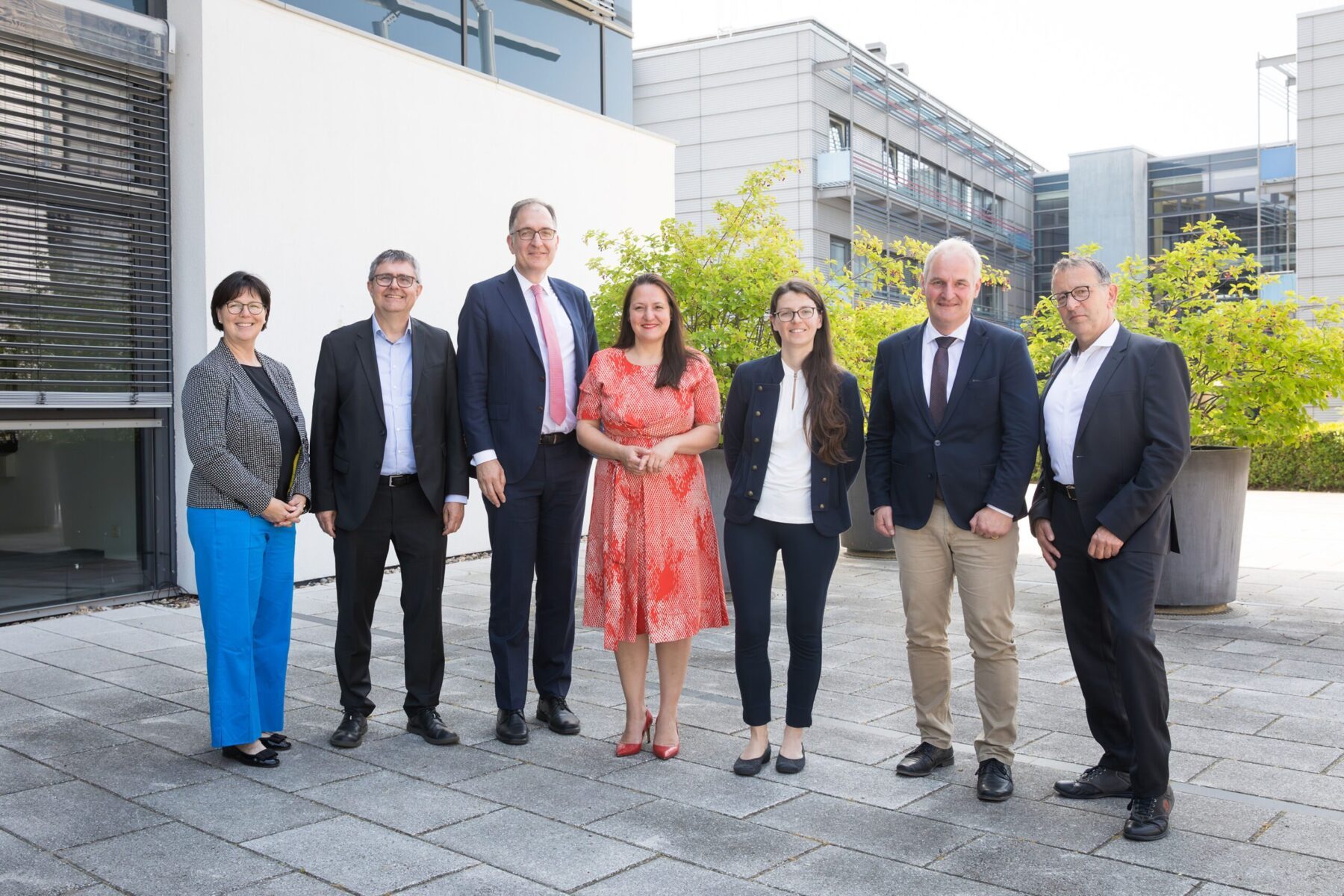
Max Planck Institute of Colloids and Interfaces celebrates anniversary
30 years of cutting-edge research – On 9 June, the Max Planck Institute of Colloids and Interfaces (MPIKG) celebrated its 30th anniversary with a ceremony. After greetings from politics and science, the MPIKG looked back on the last three decades, in which it has developed into a world-leading research institution for basic research with about 300 employees.
Research Minister Dr. Manja Schüle: “Learning from nature means learning for a sustainable future – this has been the maxim of the Max Planck Institute of Colloids and Interfaces for 30 years. There, extraordinarily successful research is carried out at the interface of physics, chemistry and biology on resource-saving, recyclable and regenerative technologies and therapies. For example, for saving trees in our World Heritage Parks, producing inexpensive energy storage systems or using sugar molecules as the basis for medicines. The MPIKG has placed its anniversary under the guiding theme ‘Research for a Sustainable Future’. In doing so, the institute underlines its extraordinary scientific success story and emphasizes its immensely important role in shaping our future. I would like to thank all employees of the MPIKG for their groundbreaking work – here’s to the next 30 successful years! Congratulations!”
In 1999, the MPIKG was the first institute to move into the MPI research campus in Golm. Bernd Rubelt, Councillor for Urban Development, Construction, Economy and Environment of the City of Potsdam, comments: “When we look back on the 30 years that lie behind the institute, it can be said that the MPIKG has not only contributed to the outstanding development of the Science Park, but also to the profile of the state capital Potsdam as a unique science location. The MPIKG can look back on a success story that is continuing.”
The scientists at the Institute are facing up to the major social challenges of this century. For a more sustainable use of material resources, new chemical and materials science solutions are needed, which the MPIKG wants to create as an innovative research institution. Research is being carried out on ideas for a circular economy based on nature’s example, in which materials are reused and recycled, are self-healing or adapt to environmental conditions. Within the four research departments, the institute has the ideal conditions, with the right minds, the necessary expertise and the most modern equipment:
Department of Biomaterials: The pioneering achievement of Prof. Peter Fratzl’s department is the systematic investigation of the relationship between structures and properties of biological materials such as bones, wood and mussel shells. The aim is to learn from nature in order to make materials and their use better and more sustainable. Materials science knowledge of bone is also needed in medicine to improve fracture healing or to treat osteoporosis. Department of Biomolecular Systems: The core competence of Prof. Peter H. Seeberger’s department lies in the production of complex sugar molecules using an automated synthesis machine. This method is used to research, for example, vaccine candidates against multi-resistant (hospital) germs as well as active ingredients against other threats to human health.
Department of Colloid Chemistry: Prof. Markus Antonietti’s department uses green chemistry to construct easily accessible and sustainable molecular building blocks for larger units and materials. In this way, state-of-the-art energy storage systems as well as inexpensive and sustainable catalysts are being created, which, among other things, make “artificial photosynthesis” possible, and thanks to green chemistry, “artificial humic substances” are to improve our soils in the future.
Department of Sustainable and Bio-Inspired Materials: The department of Prof. Silvia Vignolini deals with the question of how natural materials are assembled into complex architectures in living organisms and how these architectures determine their response. By understanding the design principles found in nature, it is possible to produce a novel class of truly sustainable functional materials using only natural resources and environmental conditions.
The MPIKG from 1993 to the present
On October 1, 1993, the institute was founded by the Max Planck Society as one of the first in the new federal states. After reunification, the German Council of Science and Humanities evaluated the institutes of the former Academy of Sciences of the GDR: The MPIKG emerged from the Institute of Physical Chemistry and Organic Chemistry in Berlin-Adlershof and the Institute of Polymer Chemistry in Teltow. The three founding directors Prof. Markus Antonietti, Prof. Reinhard Lipowsky and Prof. Helmuth Möhwald took over the collegial management. Before their working groups were able to move into the newly built institute building in Golm in 1999, they worked at the two locations in Adlershof and Teltow.
In 2003, the Department of Biomaterials began its work under the direction of physicist Prof. Peter Fratzl. Since 2009, the biochemist Prof. Peter H. Seeberger has headed the newly founded department “Biomolecular Systems”. With the retirement of the founding directors Helmuth Möhwald (2014) and Reinhard Lipowsky (2022), the departments “Interfaces” and “Theory” were closed. Since January 2023, Prof. Silvia Vignolini’s new department “Sustainable and Bio-Inspired Materials” has been in existence. The institute will also be subject to some personnel changes over the next five years, as a further two directors will retire during this time.